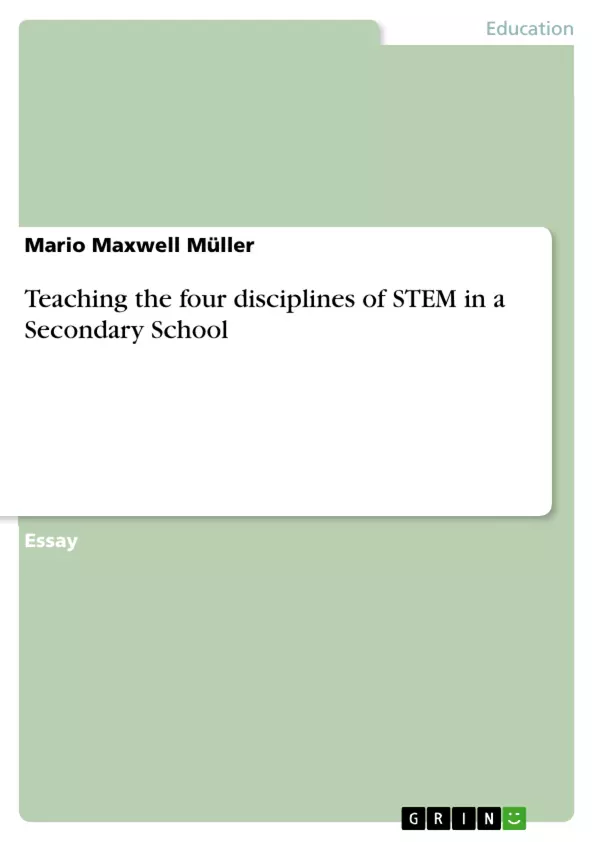The research paper will evaluate the importance of teaching the four disciplines of STEM merged to promote interdisciplinary entities for students to be able to work cooperatively together, whilst collaborating and extending their knowledge and understanding of the various topics. Some schools use these subject disciplines independently in comparison to allowing teachers to use them as one multidisciplinary entity.
The importance of using the four disciplines together is underpinned in this research paper. Students need to realise their educational potential to grow and achieve the results they deserve. Through constant support from teachers guiding them along their educational journey, they will be able to reap the rewards and results. Students' achievement will improve drastically with the help and support of the staff at the International School in Thailand. Allowing them opportunities to share their opinions, and ideas, be creative and become innovators through the implementation of technology.
Inhaltsverzeichnis (Table of Contents)
- The four disciplines of STEM
- Introduction
- Previous research conducted exploring the four disciplines together to promote STEM
- Understanding how stems work and how it promotes the following as outlined by Morrison (2006):
- Become problem solvers and able to make decisions using their knowledge and understanding of that particular topic
- Are true innovators creating new material available to share with everyone
- Become inventors who create new products which they share their designs and ideas with the areas of the world
- Are completely self-reliant who set their own agendas etc.
- Are highly logical thinkers, who can comprehend what they want exactly to achieve overall
- They are mostly technological literate and advanced in their skillset and able to use a variety of platforms of applications and programs, and
- Can implement STEM and represent their culture, and history to their education (Morrison, 2009, pp. 2-3).
- Understanding their educational needs and supporting them further is imperative for teaching and running these courses within the schools.
Zielsetzung und Themenschwerpunkte (Objectives and Key Themes)
This research paper aims to evaluate the significance of merging the four STEM disciplines (Science, Technology, Engineering, and Mathematics) to foster interdisciplinary learning. It explores the benefits of this approach in promoting collaboration, cooperative work, and the expansion of students' knowledge and understanding in secondary school settings.
- The importance of integrating STEM disciplines for student growth and achievement.
- The role of technology and computer literacy in STEM education.
- The benefits of multidisciplinary approaches to STEM education.
- The connection between STEM education and innovation, critical thinking, and problem-solving.
- The impact of STEM education on students' ability to collaborate and become inventors.
Zusammenfassung der Kapitel (Chapter Summaries)
- The four disciplines of STEM: This chapter introduces the topic of STEM education and highlights the importance of merging the four disciplines to promote interdisciplinary learning and student success.
- Introduction: This chapter emphasizes the importance of technology in secondary schools and the need for support staff and teachers to understand and promote STEM as a multidisciplinary entity.
- Previous research conducted exploring the four disciplines together to promote STEM: This chapter summarizes previous research findings that support the integration of STEM disciplines and outlines a theoretical framework for STEM education.
- Understanding how stems work and how it promotes the following as outlined by Morrison (2006): This chapter explores the various benefits of STEM education, including problem-solving, innovation, invention, self-reliance, and technological literacy.
- Understanding their educational needs and supporting them further is imperative for teaching and running these courses within the schools.: This chapter emphasizes the need to understand the educational needs of students and provide support for their learning in STEM courses.
Schlüsselwörter (Keywords)
The main keywords and focus topics of this research paper include innovation, multidisciplinary learning, STEM education, technological literacy, and student achievement.
Frequently Asked Questions
Why is merging STEM disciplines important in secondary schools?
Merging Science, Technology, Engineering, and Mathematics fosters interdisciplinary learning, allowing students to collaborate and solve complex problems more effectively.
What are the characteristics of a STEM-literate student?
According to Morrison (2006), they are problem solvers, innovators, inventors, self-reliant, logical thinkers, and technologically advanced.
How does technology influence STEM education?
Technology provides platforms and applications that enable students to be creative, share ideas globally, and become innovators.
What is the role of teachers in an interdisciplinary STEM setting?
Teachers act as guides, supporting students' educational journeys and helping them realize their potential through guided multidisciplinary entities.
What is the goal of teaching STEM as one entity?
The goal is to move away from independent subject teaching towards a cooperative model where students apply knowledge across all four disciplines simultaneously.
- Citation du texte
- Mario Maxwell Müller (Auteur), 2022, Teaching the four disciplines of STEM in a Secondary School, Munich, GRIN Verlag, https://www.grin.com/document/1285214



